#emirati jews
Text
#rabbi levi duchman#uae#united arab emirates#jewish interest#jews#judaism#jumblr#emirati jews#jewish arab relations#abraham accords
0 notes
Text
Yemen’s Ansar Allah—also known as the Houthis—poses a threat to commercial shipping in the Red Sea. From mid-November through mid-December, the group attacked at least 30 merchant ships in the area, prompting most of the world’s major shippers to reroute their vessels around the Cape of Good Hope at the southern tip of Africa. The economic effects of these attacks have yet to be fully realized, but already insurances rates for shipping lines have doubled. Not only that, but circumnavigating Africa requires more time, fuel, and ships than routes through the Suez Canal, resulting in stretched supply chains and increased environmental damage.
Freedom of navigation is a core global interest of the United States. So how is it that the Houthis are getting away with rendering the Red Sea a no-go zone for all but a few shipping lines? It’s ostensibly stunning that the Biden administration has allowed this happen—but in many ways it’s not surprising at all. The hesitance results from the role Yemen now plays in the politics of U.S. foreign policy and prevailing fears the war in Gaza will become a regional conflict—but also from the longer-term trend of Washington having overlearned foreign-policy lessons of the recent past.
The civil war in Yemen is not well understood in Washington but has nevertheless been the subject of vehement debate inside the Beltway. Although Yemen’s civil war between the government and the insurgent Houthis began in 2014 and the Saudis intervened a year later on the side of the Yemeni government, it was not until October 2018 that most members of Congress, pundits of all stripes, journalists, and foreign-policy analysts bothered to pay attention to the nasty conflict underway in one of the Middle East’s poorest countries. It was that month when agents acting on the apparent orders of Saudi Arabia’s crown prince murdered Jamal Khashoggi, a contributor to the Washington Post’s opinion page. The hit happened against the backdrop of then-U.S. President Donald Trump’s confrontation with elites, assault on American political institutions, and close ties with a variety of global authoritarians, chief among them the Saudi royal family. As a result, the twin outrages over Khashoggi’s slaying and Trump’s offensive to undermine the norms and principles of U.S. democracy became superimposed on the conflict in Yemen.
Lost in the simplistic anti-Saudi narratives that followed were the fact that the Houthis, who fight under the slogan “God is Great; death to America; death to Israel; damn the Jews; victory for Islam” are not the world’s nicest group of people. They overthrew an internationally recognized government; violate human rights; use child soldiers; and have imposed their version of “Fiver” Shi’a Islam on the Yemeni population, persecuting those who resist. During the height of the civil war, the group also contributed to Yemen’s humanitarian disaster by blocking ports through which international aid was intended to flow, became fully aligned with Iran, and fired missiles and drones on Saudi and Emirati population centers with the sole intention of terrorizing civilians.
Through it all, however, progressives in Congress and a variety of activists tended either to overlook or minimize Houthi responsibility for Yemen’s tribulations. Instead they agitated against American support for the Saudis and Emiratis, which became identified with Trump, his administration, his son-in-law, “maximum pressure” on Iran, and accommodation of Israel. Of course, the Saudi and Emirati governments have much to answer for their interventions, but among some in Washington there was a willful effort to give the Houthis a pass for their part in the destruction of Yemen. That is because the group’s anti-Americanism, hostility to human rights, and own atrocities did not fit the preferred political narrative about Yemen, which had less to do with what was happening in that country than the political battles happening in Washington. It was a dynamic that carried over into the Biden administration and its early decision to reverse Trump’s designation of Ansar Allah as a terrorist organization. For U.S. President Joe Biden to order strikes on the Houthis now—in what would surely be interpreted as an act of war in support of Israel—runs counter to much of what a growing constituency of the Democratic Party believes about Yemen.
Of course, not everything is narrative. The Biden administration is concerned that if it were to act against the Houthis, it would be widening the war in Gaza, a development it has otherwise worked hard to prevent. As a result, it has put the U.S. Navy in the area in a defensive posture. American forces will shoot down Houthi drones and missiles aimed at commercial shipping and by extension the global economy, but will not destroy Ansar Allah’s ability to harass shipping. The recent announcement of Operation Prosperity Guardian—a multilateral effort to protect commercial shipping—is a manifestation of this reactive policy.
The White House’s approach makes sense, but only in a limited way. If the president and his team are worried about the conflict expanding regionally, there must be pages missing from their briefing books. The Houthis (like Hezbollah in Lebanon) have already widened the conflict by targeting shipping in the Red Sea. The Biden administration also seems to misapprehend why the events in the Red Sea are happening. If it had a better understanding of the situation, it would know that a naval task force—no matter how formidable—will not by itself ward off attacks.
It was not unheard of for the Houthis to target shipping before the conflict in Gaza, but it seems that the Iranians encouraged them to incrementally escalate now in order to disrupt the global economy, which would put pressure on the United States and other major powers to rein in Israelis as it pummels Gaza and weakens Hamas. If Israel can actually incapacitate Hamas, it would be a significant strategic blow to Tehran, which is why the Israelis will resist at all costs international pressure to bring Israel’s military offensive to an end—which is why the Houthis will not stop attacking shipping.
As a result, if the United States wants to protect freedom of navigation in the Red Sea and its environs, it is going to have to take the fight directly to the Houthis. There is precedent for this. Everyone remembers that in 1987, the United States agreed to reflag Kuwaiti tankers and provided U.S. naval escorts for those tankers after they came under near-constant harassment from Iranian forces in the region. What many forget is that, in parallel, then-U.S. President Ronald Reagan ordered several military operations to destroy Iran’s ability to disrupt freedom of navigation in the Gulf.
One can understand why Biden has been reluctant to take a similar step so far. The president has the responsibility to use the United States’ awesome force judiciously. But to compel actors not to act—to deter them—sometimes requires a country to not just brandish its military forces but actually use them. Critics will no doubt argue that this prescription risks ensnaring the United States in yet another open-ended conflict in the Middle East. Fair point, though the search for a risk-free policy is as close to a unicorn as one can get in foreign policy. Besides, disrupting or destroying the Houthis’ ability to disrupt shipping is hardly akin to the overambitious policies of the past aimed at regime change and remaking of societies. Rather, it’s a move to protect a vital national interest.
Many in the American foreign policy community seem to have overlearned the lessons of the recent past. Either that or their analysis begins and ends with the idea that the United States is the problem in the Middle East. The fact remains that, as difficult as the last three decades have been for Washington there, the United States still has interests in the region and freedom of navigation is one of them. To be self-deterred in this instance is to be self-defeating.
3 notes
·
View notes
Text
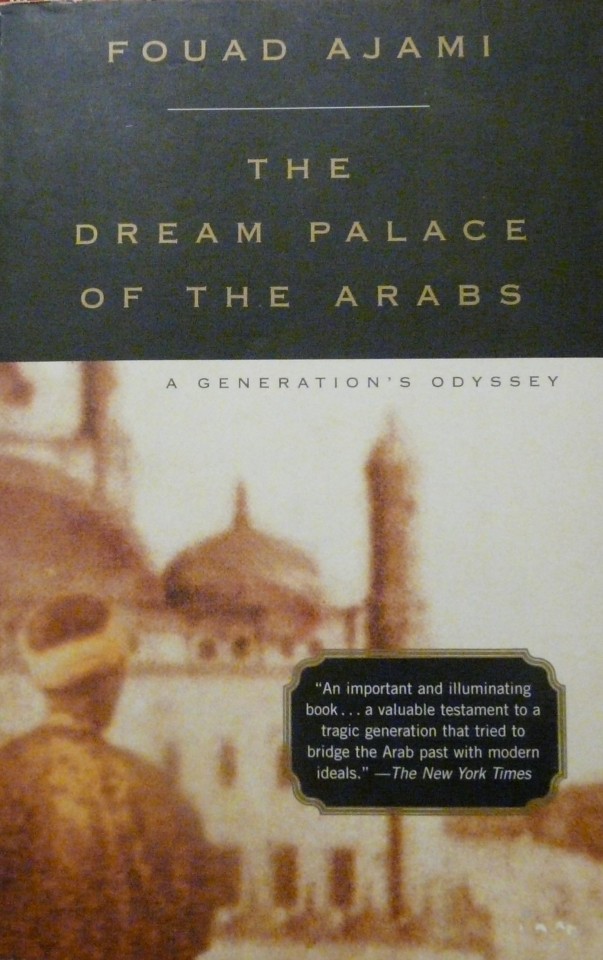
Book Review
The Dream Palace Of the Arabs by Fouad Ajami
The Middle East is planet Earth’s permanent snafu. While the troubles there didn’t start in the 20th century, it is clear that the Arabic lands since World War II have been a continuation of their turbulent past and a sad precursor for where they are heading in the future. Fouad Ajami takes a look at modern Arabia and shows how it relates to the ideologies of Arab intellectuals in The Dream Palace Of the Arabs.
The Arabian lands span an arc across the globe from western Africa to Iraq and the Arabian Peninsula in the east. Most of what Ajami writes about is in the middle of this region with the heart of it all being in Iraq, Syria, Lebanon, and Egypt. The work begins in post-World War II during the time of Arab Nationalism. Using the frustrating life of Syrian poet Khalil Hawi as an anchor for the narrative, Ajami shows where Arab Nationalism came from and why it failed. In the postwar world, Arab intellectuals were eager to break free from colonialism and European domination while they were simultaneously fascinated by European ideologies. Not just nationalism and modernism but also socialism, communism, capitalism, and even fascism became part of the intellectual lives of poets, novelists, college professors, and journalists. Any kind of “ism” that spread out of Europe at the time got embraced by this small class of educated people. It was Arab Nationalism and Pan-Arabism that eventually emerged as the most dominant forces. Pan-Arabism failed in its attempt to unite all the Arabic people under one ethnic umbrella, be they Muslim, Christian, Jew, or anything else. Tribalism and sectarianism proved to be stronger markers of identity than ethnicity. Regional differences were too vast and Arab Nationalism took over. Arab intellectuals pushed people to unite within national boundaries; it embraced the blood and soil element in fascism This was doomed to failure too because of so many sectarian differences. In addition a lot of Arabic people hated their leaders, making nationalism a dim hope. The dreams of Arabic unity shattered and Khalil Hawi committed suicide in despair.
Ajami continues on with Middle Eastern history in tandem with the poets Nizar Qabbani and Adonis. This section covers the time period from the 1960s or so up until the Gulf War when Saddam Hussein invaded Kuwait. Both poets continued on expressing their desire for Arab unity and their muted disgruntlement with the growing autocracy amongst Arab politicians. Three majr events disillusioned Arab intellectuals even further. One was the Iranian Revolution, the time when the Persian, non-Arab Muslims asserted themselves as the world leaders of Muslim ideology and political power. Even worse, the Iranians were predominantly Shia and this set off a long series of clashes between Sunni and Shia Muslims in the Arabic lands. The next big obstacle to Arab unity was the oil industry boom on the Arabian Peninsula and the rise of the petrodollar. Suddenly Saudis, Emiratis, Kuwatitis, and Qataris saw themselves as richer and superior to the other people of poorer Arabic nations and they didn’t hesitate to show it. Then the rise of Saddam Hussein in Iraq dealt another blow to the intellectual’s dream of Arab unity. Iraq lost the war when they invaded Iran and when Hussein invaded Kuwait, the Saudis brought in America to fight off the attack. The impression left on the artists and scholars was that Arabic people were too weak to handle their own affairs and, even worse, members of their own ethnic group couldn’t be trusted or relied upon. A sense of dismay set in.
Ajami also goes into brief details about the Lebanese Civil War in the 1980s. Up until that time, the west end of Beirut was akin to the Left Bank in Paris with chic cafes and the presence of the universities. It was a haven for progressive, upwardly mobile Middle Eastern people. Then the Palestinians invaded southern Lebanon and tried to force the Marontie Christians off their ancestral homeland. The Palestinians lost, but progressed onward to West Beirut and merged with the Iran-backed Hezbollah. West Beirut turned into a ghetto dominated by street gangs of Palestinian and Shia thugs. Anti-intellectualism went on the rise in the Middle East from then on.
Ajami move on to an analysis of Egypt in the eras of Anwar Sadat and Hosni Mubarak. Egypt, along with the rest of the Arabic nations, began a decline into autocratic governments, punishment for intellectuals who challenged their authority, and a rise in anti-Jewish conspiracy theories, political Islam, and Islamic fundamentalism. The lives of Egyptian intellectuals became dampened by governmental persecution and terrorist attacks from fanatical Muslims, some of which were deadly. Ajami is actually quite sympathetic to Sadat, especially because of his efforts to make peace with Israel, but he is also critical of the increasingly totalitarian nature of his government. Ajami has no sympathy at all for Hosni Mubarak.
The final section of this book examines the role that the Israeli-Palestinian conflict has in shaping the intellectual life, or I should say the anti-intellectualism, of contemporary Arabic society. While acknowledging the tragic displacement of the Palestinian people, Ajami is also critical of the way Arabs, particularly journalists and Muslim fascists have turned anti-Zionism into their primary ideology since the 1990s. He points out that Shimon Peres and Yitzhak Rabin did everything they could to make peace with their neighbors, most of which, like the Jordanian royal family and the Egyptian government, had a low opinion of the Palestinians from the start, even laying claim to the land that is now owned by Israel. There was a time when Jordan claimed Palestine as their own territory and even denied that Palestinians had a right to their own nationality. Ajami also points out how Arabs turned against their leaders like Sadat and both King Abdullahs from Jordan for trying to make peace with Israel. He even points out how much Arabs hated Yasser Arafat for agreeing to the current borders of Gaza and the West Bank in a pragmatic attempt to prevent further wars with Israel. But the fascisitc elements in the Middle East got their way and the result has been a never ending cycle of attack and counter-attack in the so-called Holy Land ever since.
Fouad Ajami’s whole concept of The Dream Palace Of the Arabs is that Arabic intellectuals have been chasing after utopian solutions to their problems. When one naive ideology fails they move on to another naive ideology. Now these intellectuals have run out of ideologies and a lot of the poets have degenerated into writing vicious screeds against the Jews or retreating into a comforting and toothless womb of sentimental love poetry with no political ambition at all. Ajami’s writing is roundabout and never direct, but if you follow his argument carefully, you realize he is making an argument pragmatism. That means working with what you have within the realms of the possible. Arabs might not like the political choices they have, but if they are the only choices it is wise to do the best with what is there. Progress only happens in stages anyways. No savior or messiah is going to come and put eveything in order. No war is ever going to create stability or independence.
After living in the Middle East, I can supplement Ajami’s argument with my own observations regarding the anti-Jewish rhetoric and conspiracy theories that run rampant in the region. Arabic people have legitimate grievances against their autocratic governments, but censorship is heavy and criticizing their leaders is extremely dangerous. It is my contention that these politicians encourage the hatred of Jewish people and Israelis as a valve for releasing psychological pressures resulting from frustrated political desires while at the same time serving as a deflection away from the governments that are the actual source of people’s anger. It’s better for the government if people hate the Jews rather than the politicians. The unintended consequence is that instead of endangering the stability of Israel, the stability of the entire world is at risk due to radicalization and terrorism in the Arabian lands.
Fouad Ajami has a compelling perspective on the Arab intellectual and Arabic society in general. The worst thing I have to say about this book is that his indirect style of making an argument can be frustrating for the reader at times. While he has a definite point to prove, he never states it clearly and directly so that the effect is a kind of wishy-washy dance around what he wants to say. That indirect style may be the result of living under a repressive political regime, but then again it may just be the way people communicate in the Middle East, or maybe it is a little of both. There are also times when he includes references to literary works by Arabic authors simply because they are known outside the Middle East and not necessarily because their works lend anything of immediate value to Ajami’s thesis.
The Dream Palace Of the Arabs may not arrive at the conclusion that Arabic people want to hear. I imagine some people will uncritically hate this book simply because Fouad Ajami wants Arabs to have peaceful relations with Israel whereas he sees that politicians and journalists are making the situation worse for Palestinians, not better. I think what he has to say should be heard because the wars in the Middle East are resulting, so far, in nothing but eternal warfare. Simply put, Ajami is saying that Arabs need to get their feet on the ground, get their heads out of the clouds, overthrow the dictators, and come up with a better way to solve problems. It is a bitter pill for some to swallow, if they even bother to swallow it, but it is something that needs to be said anyhow.
0 notes
Link
Over the past two decades, this obsession with identity has intensified and spread. Progressives are now incapable of talking about anything important without mentioning human beings’ immutable traits.
Any politics of identity was bad for the Jew. On the right, the identiarians said that the Jew lacked whiteness — it was a new version of the old Nazi claim about our impurity. On the left, the Jew was said to have too much.
In 2021, we are well-aware of the white-nationalist inanities. We have memorized the horrific footage from Charlottesville. We remember every Jew murdered in Pittsburgh and in Poway.
But their chants of “Jews Will Not Replace Us” are now being joined by the identitarians of the left, who wield vastly more capital and power, in government, in the media, in the universities, in Hollywood, and in Silicon Valley. (It’s curious that Rep. Rashida Tlaib has accused Israel of “forced population replacement.”) Together, they form a bleating chorus of grievances. Somehow their roster of The Hurt never includes the Jew.
The betrayal of the Jew has been building. It started with an unexpected moral relativism (one recalls Howard Dean, on the presidential campaign trail in 2003, saying it was not America’s place to take sides in the Israeli-Palestinian conflict). Then there were the apologetic Jews, the Jews who felt, as so many Jews have felt across the centuries, that they must have done something wrong, the self-haters, the internalizers, who fashioned themselves into perfect fig leaves. This escalated into a low-simmering hostility (with Joseph Lieberman, the one-time vice-presidential nominee, slowly exiting his party), and the coolness of Barack Obama, and his insistence on an Iranian nuclear deal that seemed to excite American progressives more than any Israeli (or Saudi or Emirati) general.
Then there were the activists. All of them seemed to have a — what’s the word? — problematic relationship with the Jewish community. It wasn’t just an incident or untoward comment. It seemed characterological. The Women’s March was helmed by a Louis Farrakhan acolyte who was not shunned, but put in the pages of Vogue and now stars in an ad for Cadillac. Black Lives Matter was birthed by a fake Marxist who apparently enjoys when her book is compared to Mao’s, and whose original charter accused Israel of “genocide” and “apartheid.”
The progressives will respond that there is nothing antisemitic about criticizing Israeli policy. They are right! All governments should be scrutinized. But criticism of Israeli policy is often just criticism of Israel’s existence. We know this because the criticized policies almost always involve Israel being able to defend itself against hostile neighbors (being able to exist); and because there is an obsession with Israel that distinguishes it from any other country or foreign-policy issue. Countless Muslims have suffered at the hands of the Chinese, Indians and Russians — to say nothing of the Assad regime having incinerated as many as 600,000 Syrians, the nearly 500,000 Palestinians confined to refugee camps in Lebanon, or the indentured servants, including many Palestinians, in the nearby Gulf. This is not whataboutism. It is perspective.
13 notes
·
View notes
Photo

Imagine all the people living life in peace.
An Israeli Jew and Emirati Muslim pray side by side in the United Arab Emirates.
This is what peace looks like.
Gili Masami
Israel Ministry of Foreign Affairs
25 notes
·
View notes
Text
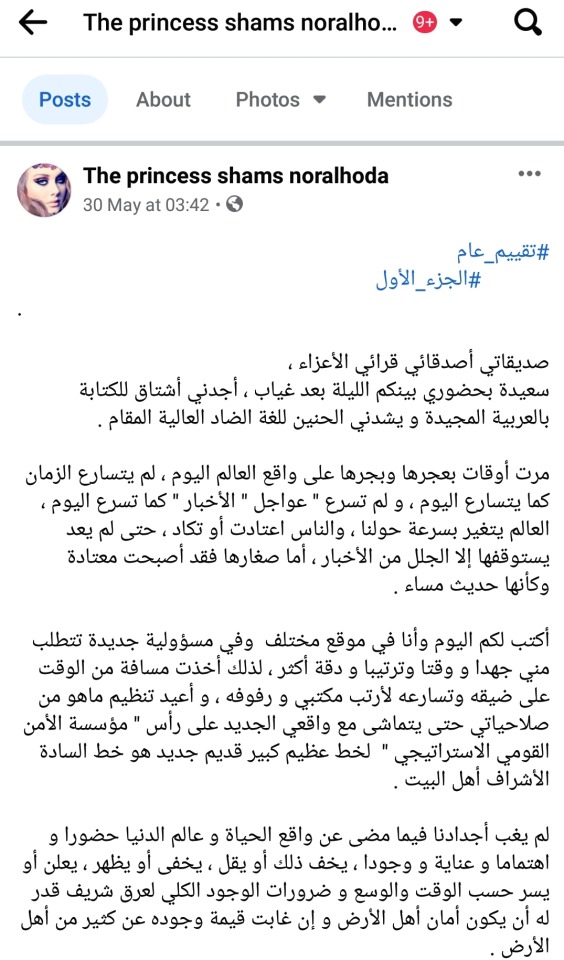

#public_review
#part One
My dear friends my dear readers,
I am happy to be here with you tonight after an absence, I find that I long to write in glorious Arabic, and I am drawn to the nostalgia for the high-ranking language of the Arabic language.
Times have passed by dragging them on the reality of the world today, time did not speed up as it does today, and the “rapids” of news did not speed up as it speeds up today, the world is changing rapidly around us, and people are accustomed or almost, until they are no longer stopped by nothing but the greatness of the news, as for its young ones, I became accustomed as if it was an evening talk.
I am writing to you today while I am in a different position and with a new responsibility that requires effort, time, arrangement and more accuracy, so I took some time, due to its tightness and urgency, to arrange my office and its shelves, and reorganize what I have to do with my new reality at the head of the “National Security Institution” The strategic “for a great old great new line is the line of the noble gentlemen, Ahl al-Bayt.
Our ancestors in the past were not absent from the reality of life and the world of this world in presence, attention, care and presence, that is hidden or less, hidden or apparent, announced or facilitated according to time and space and the necessities of the total existence of an honorable race that is destined to be the safety of the people of the earth, even if it is absent. The value of his existence for many of the people of the earth.
Since our grandfather Adam we have been on this earth and our existence continued throughout the period of our grandfather Idris, Noah, Abraham, Ismail, Jacob, Isaac, Yusuf, Yunus, Hod, Moses, David, Solomon, Jesus, the seal of the prophets, Muhammad, his guardians and the guardians of his lineage, peace be upon them.
We have been here since our grandfather Adam, peace be upon him, descended to this earth, and we will remain until God authorizes us to return to the motherland after the world is filled with justice and equity, as the oppressors “Satan and his evil descendants” filled it with injustice and aggression.
We were here, entrusting the one who is going to the next with the reins of the honorable existence on this earth until he comes who is the first and the last in the order of the immortal ones.
We were here, and we will remain here until God permits us to return to our homes. The land is ours, glory is ours, and woe to those who give us refuge.
This is the compass of existence for us, the people of the house of prophecy and the message, the houses of honor and the king.
Today, and close to the days of God, the world witnesses events that were transmitted by our ancestors, Kabra, from Kaber, they told us and they told all people, including what reached these generations healthy and unharmed from the forms of distortion, fraud and deception, and some of them were obtained by the hand of treachery, so I changed what I changed to People lose sight of the road and lose their compass.
Our mission on earth is to establish the pillars of the House of Glory so that God will be worshiped knowingly and people may live in safety, knowledge, security and prosperity, and coexist with nations and other creatures in harmony and peace. Satan wants to mislead people far astray, and his party wants to avoid the path of God and They abandon the teachings of Heaven, people fight and kill each other, diseases and injuries spread, and people live in distress, distress and anxiety, fighting over the small and despicable thing.
This is the battle of life that the world and the inhabitants of the earth live in today.
So, let's get out of this language of abstraction to the language of today's reality, and let us speak the language of analyzes and use the propane of strategies so that our language is in the language of our people, so that the Arab and the non-Arab alike can understand you.
#The reality of the Arab region
#sham_events
Do any of you remember “Donald Trump” today, surely many people today no longer remember him?
“Donald Trump” is the pre-current US president who acquiesced to the “Sheldon” project and thought that “the deal of the century would grant him a second presidential term, and when he felt that he would lose that in favor of the American Calvary Movement candidate, he mixed the papers of the region in a strange way outside the established decisions to make the days of his successor black.” in judgment.
Let me speed up the details so that we can go through what is hardly mentioned in the "media today except for a little bit."
#Salt_hospital events
Do you remember what happened then??? a
I think that many have forgotten, except for those sitting in the corridors of the "Jordanian Intelligence".
The answer received by "the Jordanian monarch" at the time, along with the Jordanian strategic depth in Salt Hospital, was a "rude response" from "Netanyahu" to not authorizing his plane to pass over the airspace of the Hashemite Kingdom of Jordan.
Yes , it was a " rude response " that embarrassed even the " Emiratis " who were appalled that a " special force " belonging to the Gladio operating under the command of " Netanyahu " would commit this heinous act .
In order to do so, it will be planned to strike members of the royal family against each other and prepare the ground for the assassination of Prince Hamzah and accusing His Majesty King Abdullah of this until the Hashemite family’s contract is broken and Jordan disintegrates in the face of the weak social and economic situation in which it is living due to “brazen planning” since the time of the nineties, after the assassination of “Isaac Rabin” at the hands of “Gladio” himself, and then work is done to establish a republican regime under popular pressure that will be a puppet in the hands of “Netanyahu” and his team, and had it not been for the grace of God and the intervention of the Jordanian strategic depth in harmony with the general strategic depth in the region and the world, the world today would be witnessing the birth of A new Gladio regime under the name of the "Republic of Besan" is ruled by "Fertoot", similar to the famous banana states.
What can be said today regarding Jordan has been said, and the last word that must be said as clearly as possible is that the security of Jordan is all of Jordan, the people of Jordan, all the people of Jordan, and the security of the Hashemite royal family, the entire Hashemite royal family, and that His Majesty King Abdullah and the order of government In Jordan, the security of all the nobles of the world will not be allowed to be threatened at all, and this saying applies to every royal family of honorable origin in Arab, Islamic and even global geography and does not stop at the borders of Jordan only.
I hope that "Netanyahu" and his team are well aware of this, I hope so.
And I hope again that the Arab peoples will realize the following:
Through the “gladio agents” who are everywhere in the joints of administrative, political, economic, educational, media, governmental and other life, political action in every country and system is underestimated, and sabotage is done from within in order to strike peoples with their systems and plunge them into wars of attrition. absurd interior, until it is exhausted well in stages, then the stage of total overthrow comes with multi-use revolutions, even if one system falls after another until the whole world falls prey to the absolute demonic control of the systems and then the peoples are lost to be completely enslaved.
Of course, not all the policies of the Arab regimes are bad, and not all of them are good. As a result of the complexities of daily management and the intended mistakes of domestic agents, the efforts of states are underestimated and the moral existence of the state and the regimes as a whole is undermined.
Let us remember the recent past then,
When the Ottoman Empire fell, the citizens of the state dispersed and states appeared by virtue of "Sais-Pico", then the monarchies began to disappear in the Arab and Islamic world and the world in general, then "Gregory" took control of Europe and most of the governments of its regimes, in turn, in favor of emerging republican regimes, most of whose leaders are from lineages Overwhelmed, it looks at the ruling as a gain and not a debtor, so competition and then hatred increases among the parties to the competition greedy for power, so the poor of yesterday overcome the strong of today, who are supported by the forces of the “Gladio” and plunder what they are able to achieve, then the nation becomes dwarfed and its existence weakens whenever the ruler is overpowered by the people. They do not know their origin and they do not have a covenant of satiation, and here personal interests prevail over the higher interest of the nation, and the likes of “Netanyahu” and Netanyahu’s godfathers, who, of course, have nothing to do with their personal interests, do not represent a religion, a belief or a principle.
And when Gregory overthrew the Shah’s regime in Iran, another “problem” appeared for the region, which many think was an “opportunity.” Gregory wanted it to be a “religious problem with the taste of Shiism” so that people would be alienated from religion and from the love of the people of the Prophet’s house May God’s prayers and peace be upon him and his family, just as he took advantage of “the persecution of the Jews of the world” and their longing for a state that would gather them from the diaspora and protect them within the land of their ancestors, according to the “interpretations” of some rabbis of the prophecies of “Prophet Daniel” as explained by “Maimonides” in his books about the day of the end of time, in order to These people hit these people under religious names, in the midst of everyone forgetting that religions came and emerged through the prophets who were truly sent from God, and that politicians seeking interests did not establish them even if they were wrapped in black turbans or even black pants.
Neither those in the new “Iran” represent the Muhammadan religion in the same way as a Shiite, nor do those in “Israel” represent the Mosaic religion or the teachings of the tribes.
Simply put, "Netanyahu" is a politician even if he is a Jew by religion, and "Khamenei" is a politician even if he is a Shiite Muslim.
It is simpler than this..is that when he comes “who is to send” the final tribe of the Prophet, with whom the nations will gather, then people from all the heavenly religions follow him with their doctrines on the truth that he brought, and this is what the “Satan” and his followers do not want and cannot stand… That's why I said at the beginning #we were here and we will stay here the earth is ours the home is ours the mountain the plain the river is ours
#Our_We_The_Sons_of_Adam_And_Noah_Ibrahim_Muhammad_Khatem_of_Prophets.
#us_not_to_the_devil_nor_the charlatan_of_Samaria
#us_we_the_people_of_the_old_house
point, full stop
Therefore, all the peoples of the region and the world should be well aware of what is being woven and not fall into the traps of demons and their snares.
The first part is over
My respect and appreciation to all
#Princess_Shams_Aslan_Noor Al-Huda
#Princess_Shams_aslan_noralhoda
#National_Security_Advisor to the nobles_Ahl_al-Bayt
_______
This article was published on facebook in arabic on the page official of the princess Shams aslan Noralhoda. ( 30/05/2021)
4 notes
·
View notes
Photo

The Cognitive Dissonance of US backed Islamist Terror
The notion that the US is against either Islamist terror or Islamist regimes is among recent history’s more profound examples of Orwellian scale propaganda. A decades long state sponsored disinformation psy-op, directed at the American citizenry, has succeeded in creating broad cognitive dissonance among an American public who’s breathtaking ignorance on the topic can best be described as zombie-like.
Here are just a handful of fun facts to help break the mass hypnosis:
The US
actually created the Islamist Mujahedeen terrorists, and the subsequent Taliban, in the 80’s in order to undermine– a secular modernizing leftist government in Afghanistan.
-Since 2013 the US has illegally invaded and occupied portions of the sovereign state of Syria in order to train and aid Islamist terror groups such as Al Nusra. This, not only against all international law and over the violent protest of Syria’s officially recognized, legally legitimate and, once again secular government but also against the will of–---wait for it–---the Christian and secular portions of the Syrian populace. Let me repeat this in case you missed it. The US CIA backs, trains and finances Islamist terrorists in Syria against the secular and Christian portions of its population, who continue to back their besieged secular government.
-As I write, the US is allied with Al Qaeda (yes, that al Qaeda!) in the Yemeni civil war.
-The US protects, defends and arms Saudi Arabia, the most extreme Islamist dictatorship on this earth–--a nation named after, and literally owned by a mob-like family whose Wahabist/Salafist ideology is the theological inspiration for ISIS.
Yet rather than bombing or invading Saudi Arabia as the US media’s anti-Islamist rhetoric would lead a rational observer to expect, the US not only does not attack or bomb Saudi Arabia, it backs the radical Islamist Saudi clan with hundreds of billions of dollars of space age weaponry.
Recently the Trump cabal has even floated the idea of providing the Saudis with Nuclear reactors and given a wink and nod to the suggestion that Pakistan, another US backed Islamist nation, should sell the Saudis an atomic bomb.
The unshakable US support of the House of Saud continues decade after decade and under both Democrat and Republican administrations. It does so even after 15 of the 911 hijackers turned out to be Saudis. It continues even though the Saudis and their Emirati cousins arm and finance Jihadists around the globe and spread the puritanical Wahabist/Salafist version of Islam in madrassas across Asia and Africa. It continues even as they openly, regularly execute Christians, Jews, Shiites, and ‘Pagans’ for witchcraft, simply for practicing their religion in the rather less than magic 'Kingdom’ that is Saudi Arabia. It continues even after they cut a Washington Post journalist (a legal US person) to pieces with a bone saw, in a foreign embassy with not so much as a slap on the wrist. It continues even after they kidnap and beat the visiting Prime Minister of Lebanon. It continues even after they invade and for four years now, indiscriminately bomb and starve the impoverished pre-industrialized Yemeni people next door, killing 100,000 (and counting) and bringing millions to the edge of starvation and cholera, in what the UN terms, a genocidal brutality.
The Islamist Saudi clan does all this with not only near total silence or backing from the 'free’ US media but with a green light from Washington. In fact, it does all this with the direct, active, strategic, tactical and even operational support of the US military and intelligence apparatus.
Saudi Arabia not only backs, arms and finances Islamist radicals, it provides them with their core ideology.
Saudi Arabia in fact, is ISIS, having succeeded and created a state.
It is also a US protectorate, vassal and symbiotic client state. Which means that ultimately, what the Saudis do is US approved, supported and often instigated.
What ultimately matter to US administrations, of either major political party, are the hundreds of billions of dollars from weapons sales to the Kingdom. A regime through which the West controls the supply and price of oil, maintains the dominance of the petro-Dollar as the global currency and protects, at all cost, the modern nuclear armed version of a medieval crusader state, that is Israel.
An Israel that’s both an American armed and protected nuclear fortress placed strategically to divide the Middle East at the strategic corner of Asia from Africa.
And an Israel that is worshiped with religious fervor by anti-Semitic Christian evangelical know nothings whose love of the Jewish state is only equaled by their hatred of Jews.
These American end-times believing, millenarian lunatics pray for Jewish control of Palestine, despite their racial and theological anti-Semitism. They do so because their insane and ugly eschatology tells them that this will hasten the end of the world when Jesus will return they and only they, will be 'raptured’ up into the arms of their imagined German looking version of the Christ.
The Vice President of the United states is only one of
countless high level American adherents to this grotesque, and world threatening, theology based foreign policy.
A. Darius Kamali
#Kurds #syriankurds #TrumppullsoutofSyria #KurdishYPG
#islamistterrorism#saudiarabia#tulsi gabbard#us foreign policy#manufacturingconsent#yemencrisis#millenarian#fundementalism#deepstate#military industrial complex#trump saudi arabia
1 note
·
View note
Text
Benjamin Netanyahu has been prime minister of Israel for six weeks. In the normal course of things, he’d be coming to Washington any day now. But this is no normal time; senior officials around U.S. President Joe Biden are said to be wary of inviting Netanyahu while he is engulfed in controversy over his treatment of Palestinians and a proposed judicial reform that will subordinate Israel’s Supreme Court to its parliament.
When he does come, which he will before long, Netanyahu is likelier to get a stern lecture from his old friend Biden than the usual arm around the shoulder. But Netanyahu will have an answer to any exhortations about Israeli domestic politics. The dialogue could run something like this:
Netanyahu: “I can restrain the right-wing nuts in my coalition if you give me what I really need.”
Biden: “What’s that?”
Netanyahu: “I want you to make up with the Saudis.”
That would be a head-spinning ask. Yet the regional experts I have talked to in recent weeks all agree that the one thing Netanyahu cares about—besides staying in power and not getting thrown in jail over bribery and corruption charges—is bringing Israel’s isolation in the Middle East to an end by recruiting Saudi Arabia into the Abraham Accords, the normalization agreement Israel signed with the United Arab Emirates, Bahrain, Morocco, and Sudan.
Netanyahu believes that Washington can deliver Saudi Arabia. Saudi Crown Prince Mohammed bin Salman, the kingdom’s de facto ruler, has told both Israeli and American officials that he wants Washington to treat Saudi Arabia as the major regional force he believes it is by resuming arms sales halted last fall and by offering the kind of security commitment it extends to close allies. Netanyahu will argue that Biden can sink a triple bank shot by bringing the Saudis back in from the cold. That is a terrible idea, though it contains the germ of a not-so-terrible idea.
The Abraham Accords are built around a genuine reorientation of Arab political culture. Arab regimes long propped up their shaky legitimacy by expressing implacable hostility toward Israel; states like Egypt and Jordan that ended their wars with Israel nevertheless adopted the cause of the Palestinians as their own. But while the Palestinian demand for a state slid into an exhausting stalemate over the last 30 years, the revolutionary Shiite regime in Iran came to pose an increasingly dire threat both to its Sunni neighbors and to Israel. The logic of the shared enemy trumped an ideological commitment that had lost its binding force—at least among ruling elites. In August 2020, the UAE, prodded by the Trump administration, signed a treaty with Israel that pledged both countries to peace, the normalization of relations, and cooperation on a wide range of economic and technical fields. Other states soon followed suit.
The agreement has produced many an Instagram moment. In September 2022, UAE Foreign Minister Sheikh Abdullah bin Zayed Al Nahyan made a five-day visit to Israel, meeting all major figures and paying the obligatory visit to the Holocaust memorial, Yad Vashem. I knew the accords had become a reality when, last fall, on one of my regular visits to the campus of New York University Abu Dhabi, I saw a gathering of ultra-Orthodox Jews down the hall from my classroom. As it happens, this past weekend, my Emirati students held a debate on whether Israel was a good partner for the Arabs. The affirmative side, which argued that the Arab world should look to the future rather than the past, won. When I asked the students afterward what they actually thought, six out of 11 students said they regarded the accords as a good thing. That’s only slightly ahead of Emirati public opinion, according to a recent poll.
The hard core of the Abraham Accords is regional security cooperation against Iran. Israel has now signed security agreements with Bahrain and Morocco and is helping the UAE with missile defense in the aftermath of attacks on Abu Dhabi launched by Iranian-supported Houthi rebels in Yemen. Those strikes, which have targeted Saudi Arabia as well, have helped drive Persian Gulf countries further into Israel’s orbit, whose Iron Dome system constitutes the state of the art in missile defense.
Netanyahu is surely right in thinking that the Middle East would be a different place if Saudi Arabia—the custodian of the two holy mosques of Mecca and Medina, the giant of the Persian Gulf, and (for many years) the champion of the Palestinian cause—joined this circle of cooperation. The prospect is openly discussed in Riyadh. Mohammed bin Salman is no more sentimental about the Palestinians than is Sheikh Mohammed bin Zayed Al Nahyan of the Emirates; he did not object when then-U.S. President Donald Trump agreed to move the U.S. Embassy in Israel to Jerusalem, a decision that enraged Palestinians and their supporters. David Schenker, a former Trump Middle East official, told me that the Saudi leader didn’t even mention the Palestinians in the course of a long conversation with visiting experts last fall.
So what’s the problem with the triple bank shot? First of all, the crown prince’s father, King Salman, is very attached to the Palestinian cause—as is his entire generation. If Netanyahu throws the religious zealots in his coalition a bone by expanding or formalizing illegal settlements, much less by annexing part of the West Bank, then Mohammed bin Salman, a cynical opportunist but no fool, will not accede to the accords. Second, “the Biden administration has no juice with Saudi Arabia,” as Schenker said. When Biden humbled himself this past summer to ask the crown price to increase oil production to bring down the price, the crown prince turned him down flat. The Saudis increasingly regard themselves as a rising power of the global south, working with the United States, China, and Russia according to their own interests. They are, they insist, no longer in the American orbit.
But the real reason Netanyahu’s dream needs to be quashed is because Biden shouldn’t, and won’t, make the concessions that bin Salman wants. Even leaving aside the crown prince’s highhanded and brutal behavior at home—including, but hardly limited to, authorizing the murder and dismemberment of dissident journalist Jamal Khashoggi—he has spent years pursuing a savage and self-destructive war in Yemen. It would be unthinkable for the United States to accept a NATO-like relationship with Saudi Arabia. What if MBS responded to another Houthi attack with a strike against Iran—and then invoked the United States’ security commitment once Tehran struck back? Even Trump, the best friend the Saudis ever had in the White House, would pause at that rubicon.
And Biden, unlike Trump, doesn’t share the Israeli and Saudi view that Iran can be intimidated into silence. Israel and Saudi Arabia helped persuade Trump to junk the nuclear pact with Iran, which (as a consequence) has now become an all-but-nuclear state, far more dangerous than it was when the deal was first reached in 2015. Biden needs the help of Israel and Saudi Arabia to contain Iran, but he can’t let them drag the United States into hostilities that would only make the Iranians more intractable.
Biden is not going to do Netanyahu any favors on Saudi Arabia—and the U.S. Congress wouldn’t let him if he wanted to. Maybe it won’t matter, since Israel and Saudi Arabia are bound to be drawn together by the shared Iranian threat and common economic interests. It’s dismaying to recognize that an increasingly illiberal Israel won’t cavil at Mohammed bin Salman’s casual brutality. But neither can the United States wash its hands of Saudi Arabia, as Biden hoped to do when he first took office. The president has discovered to his dismay that the Saudis’ status as the world’s “swing producer” of oil gives the country tremendous leverage over markets. And Washington does need the Saudis as well as the Israelis to stop Iran from spreading its tentacles across the Middle East. (See this report from the Council on Foreign Relations for an explanation as to why Washington can’t afford to disentangle itself from Saudi Arabia.)
Insofar as they embody a forward-looking vision of the Middle East based on human and economic development, the Abraham Accords are a blessing both to the region and to the United States. Insofar as they incorporate Israel into a Sunni-Shiite battle for supremacy in the region, they are no such thing. When Netanyahu finally makes his way to Washington, Biden will need to tell him that the United States is prepared to help shape a new order in the Middle East—but not one based on humiliating the Palestinians and forcing regime change in Iran.
1 note
·
View note
Text
Orthodox Jews Are Visiting UAE In Waves After Israeli-Emirati Peace Deal
Orthodox Jews Are Visiting UAE In Waves After Israeli-Emirati Peace Deal
A hushed Jewish community in Dubai has emerged into the open after the Israeli-Emirati peace deal. Now they’re hosting an unlikely rush of Orthodox Jews to the Gulf Arab city.
Source link

View On WordPress
0 notes
Link
ABU DHABI, United Arab Emirates — Israel and the United Arab Emirates were never at war, but the normalization of ties between these two countries, which is advancing at a dizzying pace, promises to become a very warm peace. At least that’s the impression the Israeli delegation to the Gulf country got on its historic first day here Monday.
As soon as we stepped out of the Boeing 737-900 onto the Abu Dhabi tarmac and into the 44°C afternoon heat, we Israelis visitors were all treated like honored guests.
There were Israeli flags waving alongside the American and the Emirate ones in the airport terminal.
On the journalists’ bus, bottles of water and orange juice and cookies made in Oman were waiting.
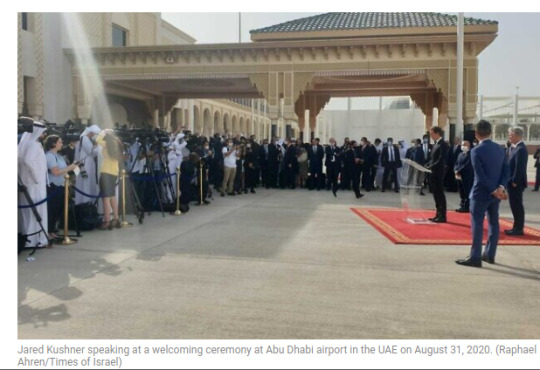
And our fast-moving motorcade — the bus for us reporters, some vans and limos for the genuine VIPS — was escorted to the hotel by local police cars, who honked brusquely whenever anyone else came too close to us on the road and might have slowed us down.
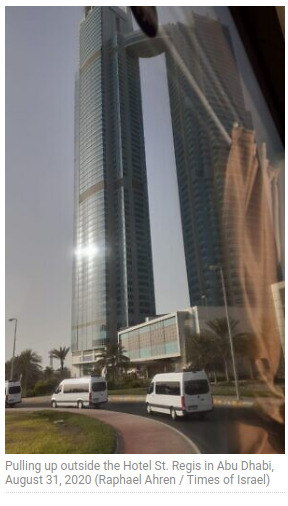
This is not the norm for visits of this Israeli level in most other parts of the world. It was not, after all, a state visit by Prime Minister Benjamin Netanyahu, or even a working visit by a foreign minister.
But we were making history — as the Israeli part of a US-Israeli delegation headed by US President Donald Trump’s senior advisor Jared Kushner and the US and Israeli national security advisers, joined by the directors-general of Israeli ministries and other Israeli officials seeking to lay the groundwork for thriving diplomatic relations.
And our hosts wanted to ensure that we felt wanted and welcome.
When I entered my room on the 37th floor of the city’s magnificent St. Regis hotel, I found some exquisite baked goods and several other gifts in a bag with the UAE’s official emblem on it.
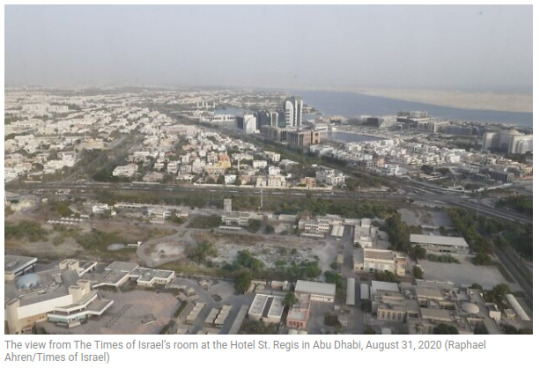
It contained a locally made dark amber and cardamon-scented candle, a jar of raw organic samr honey, and a rabaah — a spike fiddle traditionally used by nomadic Bedouins — in a fine leather bag.
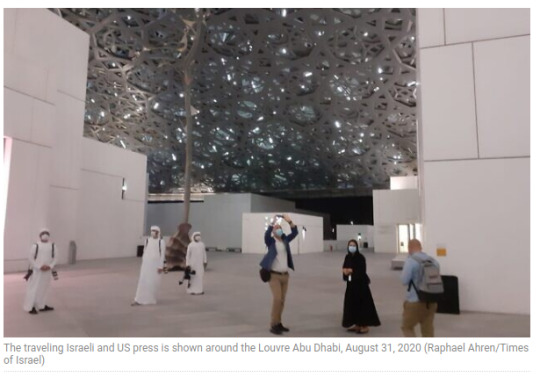
In the evening, the traveling press was invited to a quick tour of the Abu Dhabi Louvre, a sprawling branch of the Parisian museum.
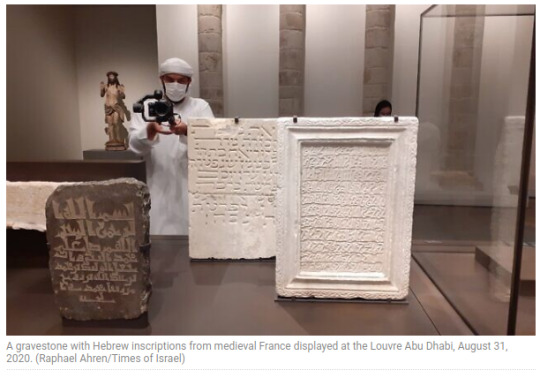
The message to us was clear: The UAE is modern, tolerant and open — you Israelis can feel comfortable about the budding peace between us.
After the quick museum tour, we were treated to a banquet dinner, with four off-record briefings from prominent Emirati officials who talked to us about Emirati culture, society and history. Besides the speakers, our hosts invited Emiratis from various walks of life to chat with us during dinner — and all of them hailed the normalization agreement with Israel, and looked forward to the ceremony formalizing ties, and deepening relations to follow. The Middle East has seen too much conflict, and it’s time for a paradigm change, they said.
“We could not be happier to have you all here,” said one of those who spoke to us, and it didn’t feel forced. “I’m literally looking at cousins,” noted another, arguing that Jews and Muslims, Israelis and Arabs, have more in common than divides them.
Memories of Manama
In the summer of 2019, I was invited to a similar gala dinner in Manama, which took place on the sidelines of the Peace to Prosperity workshop co-hosted by the US and Bahrain. The Bahrainis, too, treated our small group of Israeli reporters as most welcome guests.
Those of us who strictly observe Jewish dietary laws were offered grilled fish by our hosts, carefully wrapped in aluminum foil so it wouldn’t come into contact with the non-kosher delicacies served for the other delegates
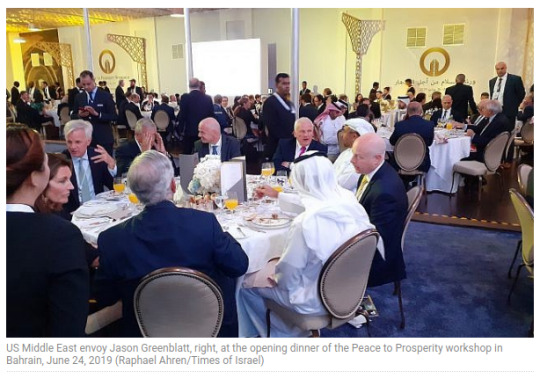
In Abu Dhabi, those keeping kosher were served a kosher-certified gourmet dinner.
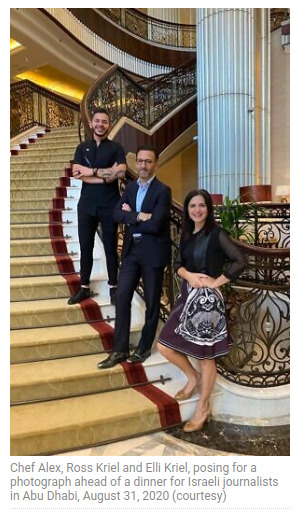
(For starters, there was beetroot salad, artichokes, mushroom tempura, zucchini balls with feta cheese, vegetarian spring rolls with sweet and spicy sauce. This was followed by salmon with lemon butter sauce, filled seabass fillet, sweet potato with fresh truffle and crispy microgreens and garlic baby vegetables. For dessert, there was “lava dark chocolate fondant and dehydrated wild berries.”)
The kosher food was prepared by Elli’s Kosher Kitchen, a Dubai-based catering business owned by Elli Kriel — the wife of Ross Kriel, the president of the UAE’s small Jewish community, who had actually brought a Torah scroll to Abu Dhabi for the occasion.
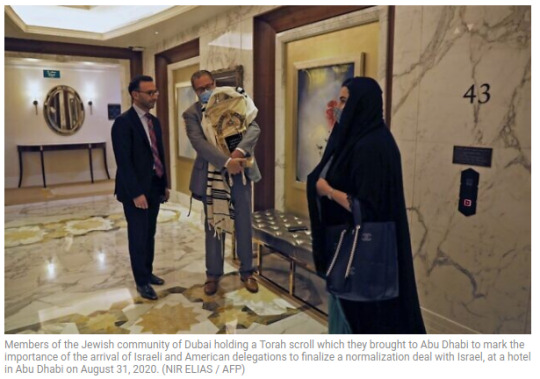
Rabbi Yissachar Krakowski of OU Kosher, the world’s largest kosher certification agency, had flown from Israel to the UAE to facilitate all of the kosher food for the Israeli delegation, including this meal. (Krakowski has experience with kosher catering in the Gulf, having organized kosher meals for the Conference of Presidents of Major American Jewish Organizations when they visited the UAE and Saudi Arabia.)
Wrong
“OK, the bad news first: The State of Israel and the Kingdom of Bahrain are not about to establish diplomatic relations,” I wrote in June 2019, after that gala dinner in Manama. “Not this week, in the immediate aftermath of the US-led Peace to Prosperity economic workshop hosted here, and nor probably in the months, or even years, to come.”
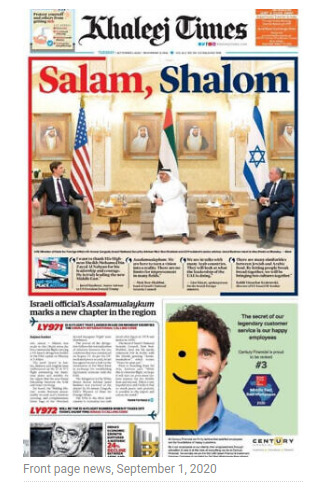
A peace deal with the Palestinians, I asserted at the time, remains the ultimate glass ceiling that needs to be smashed before any Gulf state is ready to normalize ties with Israel.
Monday’s historic nonstop flight from Tel Aviv to Abu Dhabi, and the care and enthusiasm with which Emiratis welcomed us to their country, shows how wrong I was.
16 notes
·
View notes
Photo

New story on NPR: Orthodox Jews Are Visiting UAE In Waves After Israeli-Emirati Peace Deal https://ift.tt/2Jlemvw
0 notes
Text
Donald Trump’s Gifts to Israel
The New York Times Jerusalem bureau chief David M. Halbfinger seems startled by the “extraordinary four-year stretch” in the relationship between the United States and Israel. “Political Presents” from U.S. President Donald Trump to Israeli Prime Minister Benjamin Netanyahu, the November 27 headline reads, “Kept Coming.” Prompted by the president’s decision to allow American spy Jonathan Pollard to complete his parole, leaving him free to relocate to the Jewish state, Halbfinger cites Trump’s “lavish” treatment of Netanyahu in his summary of the president’s generosity.
Among the “noteworthy gifts” that Trump has bestowed on Netanyahu—indeed, on Israel—are recognition of Israeli sovereignty over the Golan Heights and Jerusalem as Israel’s capital with the relocation of the U.S. embassy there. The recent decision by U.S. Secretary of State Mike Pompeo, changing passport rules to permit Americans born in Jerusalem to identify Israel, rather than Jerusalem, as their birthplace, as they had previously been required to do, affirms the reality that Jerusalem is, as it was millennia ago, the capital of Israel.
Were that not enough of all the bad things (implied by Halbfinger) that Trump has done for Netanyahu, his administration eliminated funding to UNRWA, the U.N. Relief and Works Agency that has provided generous subsidies to 5 million Palestinian “refugees” displaced from their homes in 1948 when Arab nations invaded the fledgling Jewish state intending destroying it. Unmentioned by Halbfinger is the fact that among those 5 million UNRWA beneficiaries, only some 30,000 are genuine refugees whose number must inevitably decline. The others are descendants of refugees whose number is guaranteed to increase over time. UNRWA is, in a word, a scam—and Halbfinger seems oblivious to it.
There is more to Halbfinger’s documentation of imagined Trump administration malfeasance. As an example of “Israel’s designs on land that the Palestinians want for a future state,” he cites U.S. Ambassador to Israel David Friedman’s endorsement of Israeli annexation of “West Bank territory.” (Halbfinger needs a reminder of former Prime Minister Menachem Begin’s memorable statement: “You cannot annex your own country.”) Friedman even urged the substitution of “Judea and Samaria” for the “West Bank” (the bygone name for Jordan’s land claim until the Six-Day War).
Halbfinger cites Pompeo’s use of “Judea and Samaria,” implicitly rescinding a 40-year-old U.S. State Department memo claiming that settlements were inconsistent with international law. Last month, Halbfinger notes, Friedman and Netanyahu gave permission for American government grants to Israeli research institutions in “occupied territory.” The only such institution is Ariel University, which Halbfinger pointedly notes is funded by Sheldon Adelson, “the casino billionaire who is a backer of both Mr. Trump and Mr. Netanyahu,” as if that undermines the integrity of the gift.
Halbfinger also notes that Pompeo, who recently visited a settlement near Ramallah, became the first secretary of state to do so. New U.S. guidelines require that products made in areas controlled by Israel be labeled “Made in Israel,” the better to reach American “consumers.” Pompeo has also urged a policy of “maximum pressure” towards Iran, asserting demands “that could have been drafted by Mr. Netanyahu,” as if that would undermine their legitimacy. “With the Trump administration’s encouragement,” Halbfinger writes, Israel is even “making common cause with Saudi Arabia, the Emiratis and other Gulf states against Iran.” Shouldn’t that be celebrated, even by The New York Times?
Halbfinger’s litany of criticism for anything of benefit to Israel seems endless. It includes Trump’s order to kill Gen. Qassem Suleimani, commander of the Iranian Quds Force and “one of Israel’s most feared adversaries.” That signified “a joint American-Israeli strategy” for “short-of-war secret strikes against Iran.” Halbfinger notes that “the Trump administration has repeatedly stood by Israel in its diplomatic fights.” Would he prefer that the Trump administration support Israel’s enemies?
Concluding his indictment, Halbfinger notes that “the Trump administration has increasingly equated anti-Zionism with anti-Semitism,” as if there was no obvious and odious connection between them. Their linkage prompted Pompeo to announce that the BDS movement that targets Israel “would be deemed anti-Semitic.” That seems problematic for the Times, although it is the newspaper’s bias against Israel and its alliance with the United States that seems to be the problem.
It is not without significance that the Times’ Jerusalem bureau chiefs who have been most critical of Israel, dating from Thomas L. Friedman’s posting in 1984, have been Jews, among them Deborah Sontag, Clyde Haberman, Jodi Rudoren, and now, Halbfinger. They have, unknowingly, followed in the footsteps of Joseph M. Levy, hired by the Times in 1928 as its Palestine correspondent, who became the conduit for anti-Zionist critics to voice their opinions in the Times opinion columns.
The Times cannot acknowledge that the American president who has provided the most support and protection for Israel since Harry Truman recognized the Jewish state moments after its birth, is Donald Trump. Its conversion of blessings into curses is hardly a model of responsible journalism.
JNS (November 27, 2020)
Jerold S. Auerbach is the author of “Print to Fit: The New York Times, Zionism and Israel 1896-2016,” which was recently selected for Mosaic by Ruth Wisse and Martin Kramer as a “Best Book” for 2019.
0 notes
Photo

Palestinians 'torn' as Israel seeks wealthy Gulf tourists
JERUSALEM, Nov 15, (AP): When the United Arab Emirates agreed to normalize relations with Israel, the Palestinians decried the move as a “betrayal” of both Jerusalem, where they hope to establish the capital of their future state, and the Al -Aqsa mosque compound, the city's holiest Muslim site. But with Israel now courting wealthy Gulf tourists and establishing new air links to the major travel hubs of Dubai and Abu Dhabi, Palestinians in east Jerusalem could soon see a tourism boon after months in which the coronavirus transformed the Holy City into a ghost town. “There will be some benefits for the Palestinian sector of tourism, and this is what I'm hoping for,” said Sami Abu-Dayyeh, a Palestinian businessman in east Jerusalem who owns four hotels and a tourism agency.
Muslims gather for Friday prayer, next to the Dome of the Rock Mosque in the Al Aqsa Mosque compound in Jerusalem's old city, Friday, Nov. 6, 2020. The Palestinian leadership has condemned the United Arab Emirates' decision to forge ties with Israel as a “betrayal,” but it could lead to a tourism bonanza for Palestinians in east Jerusalem as Israel courts wealthy Gulf travelers. (AP Photo / Mahmoud Illean)
"Forget about politics, we have to survive." Palestinian leaders have sharply rejected the recent decisions by the UAE, Bahrain and Sudan to establish ties with Israel because they severely weakened a longstanding Arab consensus that recognition only be extended in return for Palestinian statehood. The Palestinians hope to establish a state including east Jerusalem and the West Bank, territories occupied by Israel in the 1967 war. Arab support, seen as a key form of leverage in decades of on-again, off-again peace negotiations, now appears to be evaporating, leaving the Palestinians arguably weaker and more isolated than at any point in recent history.
Peace
In a striking development last week, a delegation of Israeli settlers visited the Emirates to discuss business opportunities. The Palestinians view settlements in the West Bank and east Jerusalem as the main obstacle to peace, and most of the international community considers them to be illegal. But the prospect of expanded religious tourism could end up benefiting Israelis and Palestinians alike, as wealthy Gulf tourists and Muslim pilgrims from further afield take advantage of new air links and improved relations to visit Al-Aqsa and other holy sites.
Israel considers all of Jerusalem to be its capital, and its Jerusalem Municipality is organizing conferences and seminars to help tourism operators market the city to Gulf travelers. “I'm very excited because I think it opens us up to a new era of Muslim tourism that we never really had,” said Fleur Hassan-Nahoum, the deputy mayor of Jerusalem. "Even though we have peace with Jordan and Egypt, I've never really seen any Egyptian tourists or Jordanian tourists because the peace wasn't a warm peace." Hassan-Nahoum, who recently visited the Emirates and is a cofounder of the UAE-Israel Business Council, said the municipality is reaching out to local Arab tour operators to ensure the benefits extend to all.
Advantage
“You have mixed feelings,” she said. "Some of them are a little bit suspicious, (but) most of them understand that this is going to be incredibly prosperous for them, because ultimately they're Arab speaking and so they have, I think, a unique advantage." Abu-Dayyeh expects up to 28 flights a day arriving in Tel Aviv from Dubai and Abu Dhabi, global travel hubs for long-haul carriers Emirates and Etihad, making it easier for travelers from the Far East and South America to reach the Holy Land. He's confident Palestinian operators will be able to compete.
“We're on the ground here and we've been giving this service for many years, for hundreds of years,” he said. Other Palestinians appear to be more skeptical. More than a dozen Palestinian shop owners in Jerusalem's Old City, which is largely shut down because of the coronavirus, declined to comment on the push for Gulf tourism, saying it was too politically sensitive. There are also concerns that an Israeli push to promote tourism to Al-Aqsa could heighten tensions. The hilltop esplanade in the Old City, home to the Al-Aqsa mosque and the iconic Dome of the Rock shrine, is the third holiest site in Islam. It is also the holiest site for Jews, who refer to it as the Temple Mount because it was the location of the two Biblical temples in ancient times.
The site is a raw nerve in the Israeli-Palestinian conflict, and tensions have soared in recent years as religious and nationalist Jews have visited in ever-larger numbers, escorted by the Israeli police. Last month a delegation of Emirati officials visited the site, entering through a gate normally used by Israelis and under an Israeli security escort. A small group of Palestinians heckled them. In August, Palestinian demonstrators burned a portrait of Abu Dhabi Crown Prince Sheikh Mohammed bin Zayed Al Nahyan near the Dome of the Rock.
The post Palestinians 'torn' as Israel seeks wealthy Gulf tourists appeared first on ARAB TIMES - KUWAIT NEWS.
#world Read full article: https://expatimes.com/?p=14040&feed_id=17071
0 notes
Photo

New Post has been published on https://techcrunchapp.com/telephone-calls-between-uae-israel-ring-for-the-first-time-world-news/
Telephone calls between UAE, Israel ring for the first time | World News

DUBAI, United Arab Emirates (AP) — Telephone calls began ringing Sunday between the United Arab Emirates and Israel, marking the first concrete step of a U.S.-brokered diplomatic deal between the nations that required Israel to halt plans to annex land sought by the Palestinians.
Anger over the deal however continued as well, with protesters in Pakistan criticizing the UAE and Iran making new threats about the accord, which will see the Emirates become only the third Arab nation to currently recognize Israel. The UAE responded by summoning Iran’s chargé d’affairs to criticize earlier comments by Iran’s president it described as threatening.
But for Dubai’s small expatriate Jewish community, which has worshipped for years at an unmarked villa in this city-state, the calls represented so much more than just the convenience of being able to directly dial loved ones in Israel.
“There’s a sense of a miracle upon a miracle upon a miracle, as all of these hurdles fall away and people at last can come together and start talking,” Ross Kriel, the president of the Jewish Council of the Emirates, told The Associated Press.
Direct telephone calls have been blocked in the Emirates, a U.S.-allied federation of seven sheikhdoms on the Arabian Peninsula, since its founding in 1971. That backed the standing position of Arab nations at the time, that Israel must first grant concessions to the Palestinians before being recognized — one of their few points of leverage.
Since Thursday’s announcements, Associated Press journalists have tried to make calls between the nations without success. But around 1:15 p.m. Sunday, AP journalists in Jerusalem and Dubai could call each other from both landline and cellular phones registered to Israel’s country code +972.
Over an hour later, Emirati officials acknowledged that Foreign Minister Sheikh Abdullah bin Zayed Al Nahyan had called his Israeli counterpart Gabi Ashkenazi. The Israelis later acknowledged the call as well, saying the block had been lifted from the Emiratis’ side.
Israeli Communications Minister Yoaz Hendel issued a statement “congratulating the United Arab Emirates on removing the blocks.”
“Many economic opportunities will open now, and these trust-building steps are an important step toward advancing states’ interests,” Hendel said.
Also Sunday, Israeli news websites that had previously been blocked by UAE authorities, like the Times of Israel, the Jerusalem Post and YNet, could be accessed without using means to bypass internet filtering in the Emirates.
In the UAE, a recorded message in Arabic and English would typically play prior to Sunday saying calls to +972 numbers could not be connected. The advent of internet calling allowed people to get around the ban, although these too were often interrupted.
Some in Israel used Palestinian mobile phone numbers with +970 numbers, which those in the UAE could call.
Israel and the United Arab Emirates announced Thursday they were establishing full diplomatic relations in the U.S.-brokered accord. The historic deal delivered a key foreign policy victory to President Donald Trump as he seeks reelection, and reflected a changing Middle East in which shared concerns about archenemy Iran have largely overtaken traditional Arab support for the Palestinians.
Deals between Israel and the UAE are expected in the coming weeks in such areas as tourism, direct flights and embassies. Early Sunday, the Emirates’ state-run WAM news agency announced a UAE company had signed an agreement with an Israeli company for research and study of the coronavirus pandemic.
The move has sparked anger among some who see it as a betrayal of longstanding efforts to establish an independent state of Palestinians. In Pakistan, hundreds of Islamists rallied Sunday to denounce the Emirati-Israeli deal. The Jamaat-e-Islami party chanted slogans against the United States and burned effigies of Trump. They also set ablaze American and Israeli flags.
Those protests mirror others by Palestinians that have seen images of Abu Dhabi Crown Prince Mohammed bin Zayed Al Nahyan burnt, torn and trampled upon. That’s enraged some in the UAE, a nation of autocratic rulers where speech is strictly monitored. Emiratis online encouraged fellow citizens to report comments critical of the country to law enforcement.
The deal also has enraged Iran and Turkey, regional rivals to the UAE.
On Sunday, the chief of staff of Iran’s armed forces called the UAE’s decision a “disaster.” Mohammad Hossein Bagheri urged Abu Dhabi to “revise” its position or the Iranian military may take a different approach to the nation. He did not elaborate on what that approach would entail.
“If an incident happens in the Persian Gulf and violates the national security of the Islamic Republic of Iran, even a tiny bit, and we see it from the UAE, we will not tolerate it,” Bagheri said.
On Sunday, the WAM news agency also reported the Emirates summoned Iran’s top diplomat in the country to complain about speeches by officials in Tehran it said were “unacceptable and inflammatory and had serious implications for security and stability in the Gulf region.”
The UAE reminded Iran its duty to protect its embassy in Tehran, where protesters had gathered the day before. Diplomatic posts have been overrun in the past in Iran, including in the 1979 U.S. Embassy hostage crisis.
For Dubai’s small but growing Jewish expatriate population, the UAE’s move toward diplomatic ties represents a new achievement. Alex Peterfreund, a cantor for the community, read a passage of the Torah for visiting AP journalists.
“To start from scratch is quite exciting, to know that you start a community where there was actually almost no Jews in all those centuries, it’s motivating you also,” Peterfreund said. ”We feel (like) pioneers.”
Associated Press writers Malak Harb in Dubai, United Arab Emirates; Ilan Ben Zion in Jerusalem; Nasser Karimi in Tehran, Iran; and Asim Tanveer in Multan, Pakistan, contributed to this report.
Copyright 2020 The Associated Press. All rights reserved. This material may not be published, broadcast, rewritten or redistributed without permission.
1 note
·
View note
Text
Palestinians Warn Israel-UAE Deal Imperils Jerusalem's Al-Aqsa Musjid
Angry Palestinians in Jerusalem accused the United Arab Emirates of collaborating with Israel and endangering Al-Aqsa mosque - Islam's third-holiest site - as they gathered for Friday prayers the day after the Gulf state's deal with Israel.
— Rami Ayyub | Reuters | August 14, 2020

A Muslim man walks in front of the Dome of the Rock on the compound known to Muslims as Noble Sanctuary and to Jews as Temple Mount, in Jerusalem's Old City, August 14, 2020. Reuters/Ammar Awad
Under an agreement brokered by U.S. President Donald Trump, Israel and the UAE announced on Thursday that they will normalise diplomatic ties, brought together by a confluence of interests against Iran.
The deal also envisions giving Muslims greater access to Jerusalem’s Al-Aqsa mosque by allowing them to directly fly from Abu Dhabi to Tel Aviv’s Ben Gurion Airport.
This was greeted with dismay by Palestinian worshippers filing into the tree-lined hilltop compound in Jerusalem’s walled Old City known to Muslims as al-Haram al-Sharif (Noble Sanctuary) and to Jews as the Temple Mount.
“Our brothers in the Emirates put our blessed mosque in the grip of death,” said Kamal Attoun, 60, an East Jerusalem Palestinian and Old City merchant.
Asked if he would welcome Muslims from the Emirates or the Gulf under such circumstances, Attoun said: “You’ve seen how collaborators from Saudi Arabia have been received in the past. The same fate awaits the Emiratis.”
He was referring to a pro-Israel Saudi internet influencer who was reportedly taunted as he walked through the Old City compound last year.
Palestinians have long sought East Jerusalem, where the Old City is located, as capital of a future state and have looked to Arab nations to defend that stance. If they normalise ties with Israel, Palestinians fear losing any chance of future sovereignty in the city and guaranteed access to Al Aqsa mosque.
Mohammad al-Sharif, 45, a member of Israel’s Arab minority, said he would not hold it against ordinary Muslims from the Gulf “because their rulers made a mistake”.
But he was scathing about their leaders.
“Collaboration with the UAE is worse, a hundred times worse than collaborating with Israel. That Sheikh Mohammed bin Zayed and his dirty dogs look out for themselves and their interests and the rest of us can go to hell,” he said, referring to Abu Dhabi’s crown prince.
The top Islamic official in Jerusalem, Sheikh Abdul-Azim Salhab of the Islamic Waqf, told Reuters he does “not accept the blessed Al-Aqsa mosque to be the subject of political bickering. It is higher than this tug-of-war.”
Condemnation also came from Palestinian President Mahmoud Abbas, whose spokesman on Thursday read out a statement from the leadership on Palestinian television calling the deal a “betrayal of Jerusalem, Al-Aqsa and the Palestinian cause”.
Palestinians across Gaza and the occupied West Bank rallied on Friday against the deal. Protesters in the city of Nablus burned effigies of Trump, Israeli Prime Minister Benjamin Netanyahu and Abu Dhabi Crown Prince Sheikh Mohammed bin Zayed.

Israeli Police officers take away an anti-Abu Dhabi Crown Prince Mohammed bin Zayed al-Nahyan poster from Palestinian demonstrators during a protest against the United Arab Emirates, in front of the Dome of the Rock, in Jerusalem's Old City, August 14, 2020. Reuters/Ammar Awad
ISRAELIS DELIGHTED
Meanwhile, Israel embraced the deal, with the country’s biggest-selling daily, Yedioth Ahronoth, calling it a “bold breakthrough”.
Some analysts said Netanyahu risked angering his supporters by walking back pledges to annex land in the West Bank - territory sought by Palestinians for a state - so as to do a deal with an Arab Gulf country.
“He gained a few points with the centre-left, which loves agreements with Arabs, but he lost many more points with his base of right-wing voters,” wrote Ben Caspit in Maariv.
Netanyahu, dogged by an ongoing corruption trial and criticised for his handling of the coronavirus pandemic, has hailed the agreement as a personal success in integrating Israel in the Middle East.
Israeli Police officers take away an anti-Abu Dhabi Crown Prince Mohammed bin Zayed al-Nahyan poster from Palestinian demonstrators during a protest against the United Arab Emirates, in front of the Dome of the Rock, in Jerusalem's Old City, August 14, 2020. REUTERS/Ammar Awad
On his Arabic-language Twitter account he credited Israel’s foreign intelligence service Mossad with helping to clinch the deal.
Under spy chief Yossi Cohen, Netanyahu said, the Mossad helped develop Israel’s relations with the Gulf and “ripen the peace agreement with the Emirates”.
— Additional reporting by Ali Sawafta in Ramallah; Writing by Stephen Farrell and Rami Ayyub; Editing by Mark Heinrich
0 notes
Text
The first-ever kosher kitchen launches in Dubai
Challah is a particular bread in Jewish delicacies, normally braided and sometimes eaten on ceremonial events akin to Shabbat and main Jewish holidays.
Picture Credit score:
Dubai: In September 2019, the UAE made a historic declaration by saying a brand new landmark, which can function a church, mosque and synagogue constructed in the identical location in Abu Dhabi.
The UAE has and continues to pioneer tolerance in a transfer to turn into a worldwide capital for acceptance and to instil the values of co-existence and peace.
And what higher technique to perceive and settle for different societies and religions than by means of meals?
For the primary time ever, Jewish/Kosher-style meals has been established as a cooking and supply service in the UAE.
Elli’s Kosher Kitchen was launched by long-time UAE resident Elli Kriel, who needed to supply and ship 100 per cent kosher choices for Jewish residents and guests. Elli’s Kosher Kitchen is a licensed meals supply service that may be despatched to your lodge or your house. It may cost a bit additional relying on how far you reside from Dubai.

Sluggish cooked brisket with tzimmes on the facet (tzimmes are root greens and prunes cooked with orange juice, sugar and cinnamon)
Picture Credit score:
Kriel is a Sephardi Jew, who hails from South Africa, and has been a member of the UAE’s Jewish group for seven years. In case you had been questioning, the Jewish group in the UAE is kind of small. Roughly 200 or so individuals.
“When I first arrived with my husband and children in the UAE almost seven years ago, I needed to find my way around supermarkets. I couldn’t really ask anyone where to source kosher food in the UAE since I hadn’t met anyone who kept a Kosher diet like me,” Kriel informed DailyKhaleej. “I concentrated on my family’s needs and managed to cook kosher for them from my own knowledge and by using the internet, which is full of resources.”
Kriel defined that ultimately, phrase began getting out {that a} Kosher household was dwelling in Dubai and other people travelling into the nation for enterprise would attain out and ask them for assist with sourcing Kosher meals.

Elli in her kitchen
Picture Credit score:
“This led to me to either invite them to my home or send them home cooked Kosher meals. The requests increased rapidly from there and with the launch of the Year of Tolerance, it became clear to me that the demand was far greater than what I could have anticipated,” she stated to DailyKhaleej.
Elli Kriel was uniquely positioned to supply a service that nobody else in the UAE had thought to supply. It was when the Pope got here for his historic go to that Kriel spontaneously determined to make it official and make her meals obtainable for the general public. That’s how Elli’s Kosher Kitchen bought its begin.
What precisely is a kosher weight-reduction plan?

Spinach borekas, a sometimes Sephardi / Mediterranean dish
Picture Credit score:
Kosher meals is a weight-reduction plan that’s derived from the Jewish religion. Much like Halal, Kosher requires the ritual slaughter of the animal and the prohibition to eat pork. The place this differs from Halal is that sure seafood like shellfish (like mussels and oysters) and crustaceans (like lobster, prawns, shrimps, octopus, and calamari) are additionally off the menu. Kosher eaters do eat fish, nonetheless, they should have fins and scales. To allow them to’t have smooth-skinned fish like shark for instance.
Moreover, a kosher weight-reduction plan solely permits them to eat mammals with break up (cloven) hooves that chew the cud (that’s, animals that slowly chew their partly digested meals time and again in their mouths earlier than lastly swallowing) are permitted. “Many locals are surprised to learn we are not allowed to eat camels or drink their milk,” Kriel clarified.
Bugs are additionally not allowed to be eaten, which isn’t actually a difficulty, nonetheless, which means that greens have to very rigorously cleaned and checked to make sure you don’t inadvertently eat bugs. Over the centuries, strict protocols have been established for the checking and cleansing of vegatables and fruits, which may also be reassuring to shoppers it doesn’t matter what their background.
“Since broccoli florets and asparagus cannot be adequately cleaned, we usually only eat the stems?” Kriel defined.
An vital and core Kosher observe is to not combine meat and milk meals merchandise. This even extends to utensils, serving dishes and cooking amenities. This implies you’ll not discover dishes like steak in creamy mushroom sauce or butter hen in kosher recipes.

Complete baked sea bass
Picture Credit score:
“Consequently, many kosher homes like mine, install two separate kitchens – one for meat and one for milk to adhere to these principles,” Kriel informed DailyKhaleej.
“Fortunately, I am experiencing a growing demand for kosher food in the UAE from both Abu Dhabi and Dubai thus far. We have more recently been getting requests for not just Kosher, but typical Jewish foods especially slow-cooked beef brisket and a dish called “tzimmes”, which is made with a medley of root greens, orange juice, sugar and cinnamon. Nowadays I’m busy perfecting my recipe for these dishes, which could be ordered very quickly.”
Whereas Kosher meals are usually meant to be ready in a house, ready-made Kosher meals are a distinct problem since it’s a must to intrinsically belief the complete elements and cooking course of. Meals produced in factories should be supervised and checked by a Kosher authority to satisfy the strict requirements and protocols. A certificates is normally issued to the producer earlier than any product could be labelled as Kosher. The excellent news for Jewish members of UAE society is that it’s now it’s attainable to seek out many merchandise imported into the UAE, licensed with a Kosher label (hechsher).
Kosherati: Kosher Emirati meals

These are Chebab blintzes (from the Kosherati vary). Blintzes are pancakes full of cream cheese and chebabs are an Emirati pancake. Elli added Emirati flavors of date syrup, cardamom and saffron to make chebab blintzes.
Picture Credit score:
Dubai is a metropolis full of wonderful forms of meals and cuisines from everywhere in the world, however Kriel was notably inquisitive about Emirati delicacies. Since she has been restricted in experiencing all of the wonderful meals round her as a Kosher practitioner. Her need to pattern Emirati meals, which is so new and totally different from what she has seen earlier than, has gotten the higher of her.
“I have learnt to cook certain dishes in my home. I love experimenting with local recipes is so that Jewish visitors and locals alike can see the commonalities in our foods and cultures. I am very fortunate to continuously experience the warmth and hospitality of the UAE so what better way to enhance this experience by combining our recipes made from the heart and rich in history?”
Kriel has created a spread of Jewish-Emirati fusion dishes together with Date rugelach, made with dates, orange blossom water and cinnamon rolled in a rugelach pastry.

An Emirati spin on conventional rugelach. As a substitute of chocolate, dates with cinnamon and orange blossom water had been used.
Picture Credit score:
Date cake with tahini frosting, a date loaf cake made with candy tahini frosting and pistachio crumble. Impressed by Emirati flavors with a particular mix of spices together with cardamom and saffron.
UAE welcoming Jewish residents
One of many pillars of the 12 months of Tolerance was to solidify the UAE as the worldwide capital for tolerance.
“I’m so proud to be right here in the UAE particularly at this second the place tolerance is a core worth and lifestyle. As a rule, I all the time search for the commonalities between individuals and rejoice our shared humanity.
There are such a lot of similarities to the Jewish and Arabic tradition that makes it straightforward to really feel welcomed. My husband leads the Jewish group and each of us really feel very dedicated to our life right here which we cherish.”
from WordPress https://ift.tt/3dMUSdm
via IFTTT
0 notes